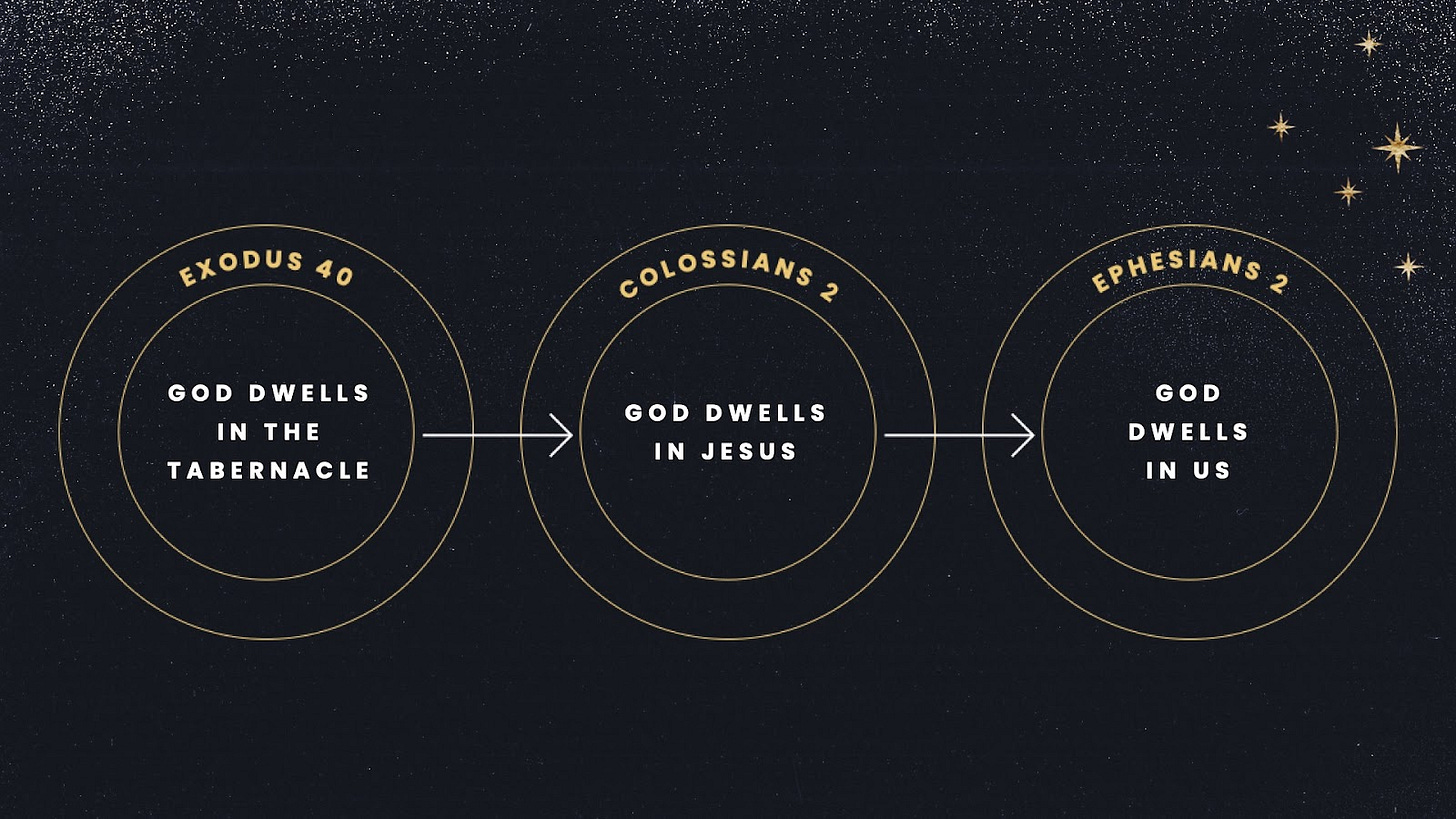We are the Tabernacle
A Brief Thought on the God Who Dwells
We are less than a week away from Christmas. So today, just a brief thought on the God who dwells with us.
The Word became flesh and made his dwelling among us. We have seen his glory, the glory of the one and only Son, who came from the Father, full of grace and truth. - John 1:14
The phrase “made his dwelling” literally means “to tabernacle.” The Gospel of John opens with this beautiful vision of the Incarnation, that Christ has come to tabernacle among us. Originally, the tabernacle was a tent-like structure designed and built as a suitable meeting place for God to come down and be with his people in the wilderness during the Exodus journey. Which begs the question, “Isn’t God everywhere? Why does he need a specific place right here?”
Yes, God is omnipresent, but throughout Scripture, we see him “go local.” Time and again, God draws specifically near specific people, in large part so that they might know where, when, and how to find him. N.T. Wright writes that, “the making, and divine filling, of the tabernacle is really the climax of the whole Genesis-Exodus story. It’s like a new creation: a micro-world where God wants to come and dwell. This is why God rescued his people from Egypt… to make them into the people in whose midst he might indeed come and live.”
My favorite line from the Christmas hymn “Hark the Herald Angels Sing” says, “Pleased as man with man to dwell, Jesus our Immanuel.” This is the essence of the Christmas story, that Jesus came to dwell with us. And as the Apostle Paul reminds us, “In Christ all the fullness of the Deity lives in bodily form” (Colossians 2:9). This is “tabernacle” language. God the Father makes his dwelling in Jesus the Son. Then, we read this:
Consequently, you are no longer foreigners and strangers, but fellow citizens with God’s people and also members of his household, built on the foundation of the apostles and prophets, with Christ Jesus himself as the chief cornerstone. In him the whole building is joined together and rises to become a holy temple in the Lord. And in him you too are being built together to become a dwelling in which God lives by his Spirit. - Ephesians 2:19-22
This is once again “tabernacle” language. Just as God tabernacles in Jesus, through Jesus, God now tabernacles is us.
Maybe during the holiday season…
…instead of meaningful connection, you feel isolated and alone
…instead of being seen, you feel misunderstood or forgotten
…instead of love, you feel heartache or grief or loss
God is closer than you think. He tabernacles in you.
The Word became flesh and made his dwelling among us. We have seen his glory, the glory of the one and only Son, who came from the Father, full of grace and truth. - John 1:14
In referencing Jesus’ “glory,” John is again calling back to the Exodus tabernacle story.
Then Moses set up the courtyard around the tabernacle and altar and put up the curtain at the entrance to the courtyard. And so Moses finished the work. Then the cloud covered the tent of meeting, and the glory of the Lord filled the tabernacle. Moses could not enter the tent of meeting because the cloud had settled on it, and the glory of the Lord filled the tabernacle. - Exodus 40:33-35
“Glory” is the Hebrew word kavod which can mean, “weight, heaviness, magnificence, or grandeur.” The best descriptions I’ve heard for kavod are “muchness” or “fullness.” Here in the Exodus story, and throughout the Old Testament, God’s “glory,” his kavod, represents his tangible presence, his muchness experienced in fullness. God’s glory in the original tabernacle had literal weight and mass (“Moses could not enter… because the kavod of the Lord filled it”).
Have you ever experienced the physical, tangible, weighty presence of God? My personal immediate response to this question is, “no.” But earlier, we read Colossians 2:9, about God tabernacling in Jesus: “In Christ all the fullness of the Deity lives in bodily form.” Then, Paul continues:
And in Christ you have been brought to fullness. - Colossians 2:10
Every follower of Jesus, as an embodied, image-bearing human being animated by the Spirit of God within, is a physical, tangible, weighty expression of God’s living presence, his glory, his muchness and fullness.
No matter what people have told you, what culture has told you, what social media tells you, never believe for a second that you don’t matter, or that your worth or value is tied up in performance, success, or social status. As N.T. Wright reminds us, “The spirit thus constitutes Jesus’ followers, corporately and individually, as Temple-people, places where God comes to dwell, points of overlap between heaven and earth.”
In his later years, John has a vision of Jesus, who declares in the vision, “Here I am! I stand at the door and knock. If anyone hears my voice and opens the door, I will come in and eat with that person, and they with me” (Revelation 3:20). I find it fascinating that here, the dwelling of Christ among and within us becomes so personal and intimate. Entering a home and sharing a meal is an experience shared only amongst family and friends, or acquaintances and strangers we are seeking to befriend. It’s an offering of ongoing relationship.
Christmas is the story of a God who goes local. The Word became flesh, tabernacling among us, bringing heaven to earth, glory into flesh, and fullness into our emptiness. This is the weighty truth of the Incarnation: God not only comes near but makes his home within us. We are the tabernacle, filled with his muchness, and invited to dine with the One who makes all things new.



